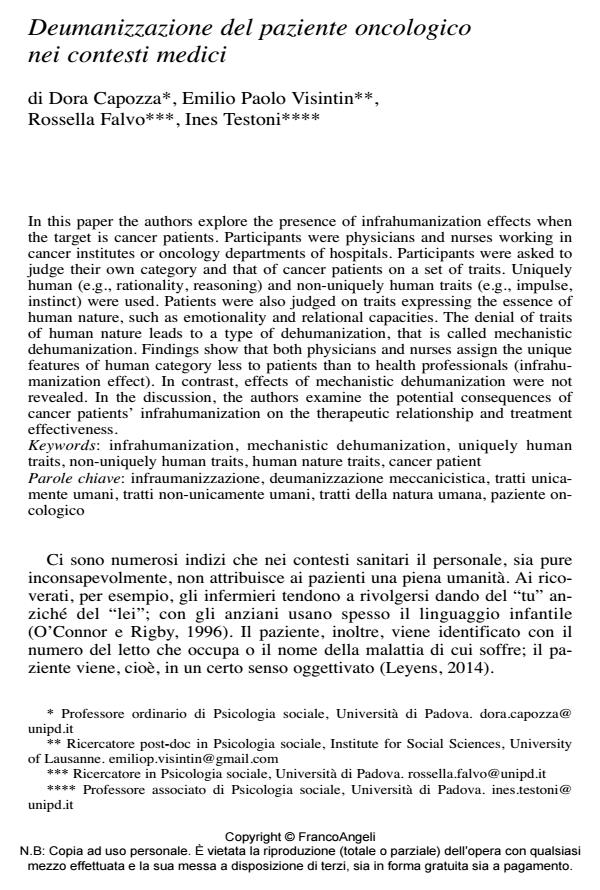Deumanizzazione del paziente oncologico nei contesti medici
Titolo Rivista SALUTE E SOCIETÀ
Autori/Curatori Dora Capozza, Emilio Paolo Visintin, Rossella Falvo, Ines Testoni
Anno di pubblicazione 2015 Fascicolo 2015/2
Lingua Italiano Numero pagine 13 P. 74-86 Dimensione file 82 KB
DOI 10.3280/SES2015-002006
Il DOI è il codice a barre della proprietà intellettuale: per saperne di più
clicca qui
Qui sotto puoi vedere in anteprima la prima pagina di questo articolo.
Se questo articolo ti interessa, lo puoi acquistare (e scaricare in formato pdf) seguendo le facili indicazioni per acquistare il download credit. Acquista Download Credits per scaricare questo Articolo in formato PDF

FrancoAngeli è membro della Publishers International Linking Association, Inc (PILA)associazione indipendente e non profit per facilitare (attraverso i servizi tecnologici implementati da CrossRef.org) l’accesso degli studiosi ai contenuti digitali nelle pubblicazioni professionali e scientifiche
In this paper the authors explore the presence of infrahumanization effects when the target is cancer patients. Participants were physicians and nurses working in cancer institutes or oncology departments of hospitals. Participants were asked to judge their own category and that of cancer patients on a set of traits. Uniquely human (e.g., rationality, reasoning) and non-uniquely human traits (e.g., impulse, instinct) were used. Patients were also judged on traits expressing the essence of human nature, such as emotionality and relational capacities. The denial of traits of human nature leads to a type of dehumanization, that is called mechanistic dehumanization. Findings show that both physicians and nurses assign the unique features of human category less to patients than to health professionals (infrahumanization effect). In contrast, effects of mechanistic dehumanization were not revealed. In the discussion, the authors examine the potential consequences of cancer patients’ infrahumanization on the therapeutic relationship and treatment effectiveness.
Parole chiave:Infraumanizzazione, deumanizzazione meccanicistica, tratti unicamente umani, tratti non-unicamente umani, tratti della natura umana, paziente oncologico
- Dehumanization and burden of care among caregivers of terminally ill patients Ines Testoni, Giulia Sicari, Lucia Ronconi, Gianmarco Biancalani, Chiara Franco, Paolo Cottone, Robert Crupi, in Health Psychology Research /2021 pp.1
DOI: 10.52965/001c.29052 - Representations of death among Italian vegetarians: An ethnographic research on environment, disgust and transcendence Ines Testoni, Tommaso Ghellar, Maddalena Rodelli, Loriana De Cataldo, Adriano Zamperini, in Europe’s Journal of Psychology /2017 pp.378
DOI: 10.5964/ejop.v13i3.1301 - Are job characteristics associated with patient (de)humanization through the mediation of health providers’ well‐being? Dora Capozza, Daiana Colledani, Rossella Falvo, in Journal of Applied Social Psychology /2024 pp.589
DOI: 10.1111/jasp.13060 - Humanization of critical care—psychological effects on healthcare professionals and relatives: a systematic review Imelda M. Galvin, Jordan Leitch, Rebecca Gill, Katherine Poser, Sandra McKeown, in Canadian Journal of Anesthesia/Journal canadien d'anesthésie /2018 pp.1348
DOI: 10.1007/s12630-018-1227-7 - Courage and representations of death in patients who are waiting for a liver transplantation Ines Testoni, Valentina Milo, Lucia Ronconi, Alessandra Feltrin, Adriano Zamperini, Maddalena Rodelli, Giacomo Germani, Umberto Cillo, Cornelia Duregger, in Cogent Psychology /2017 pp.1294333
DOI: 10.1080/23311908.2017.1294333 - Facing COVID-19 Between Sensory and Psychoemotional Stress, and Instrumental Deprivation: A Qualitative Study of Unmanageable Critical Incidents With Doctors and Nurses in Two Hospitals in Northern Italy Ines Testoni, Chiara Franco, Enrica Gallo Stampino, Erika Iacona, Robert Crupi, Claudio Pagano, in Frontiers in Psychology 622894/2021
DOI: 10.3389/fpsyg.2021.622894
Dora Capozza, Emilio Paolo Visintin, Rossella Falvo, Ines Testoni, Deumanizzazione del paziente oncologico nei contesti medici in "SALUTE E SOCIETÀ" 2/2015, pp 74-86, DOI: 10.3280/SES2015-002006